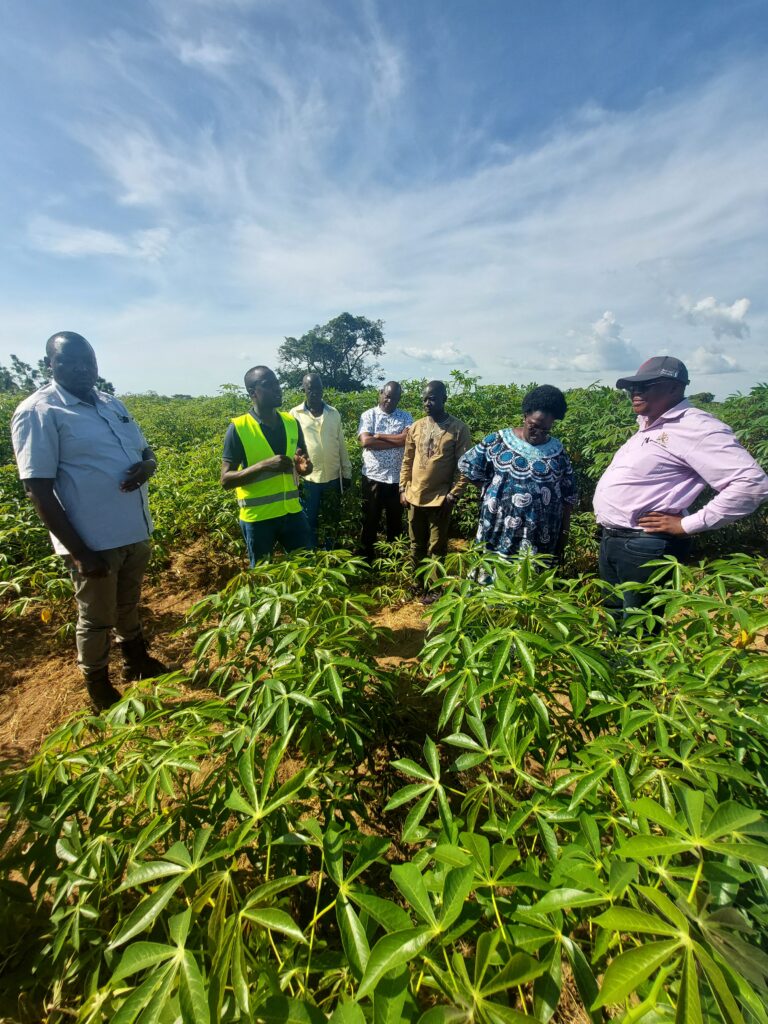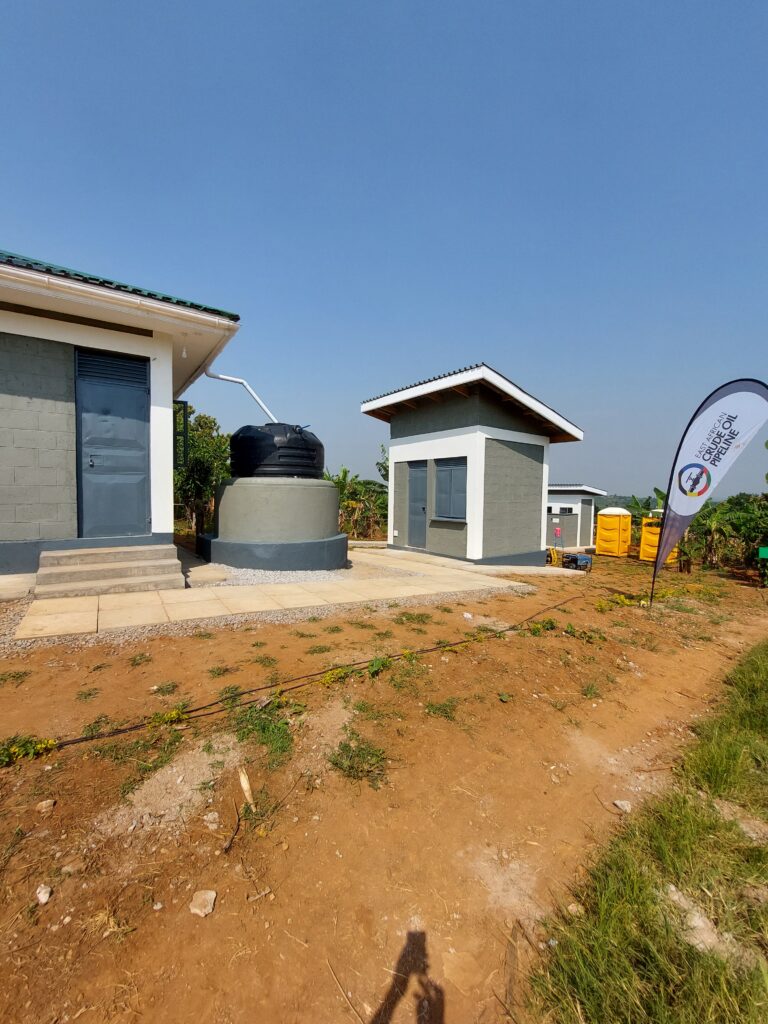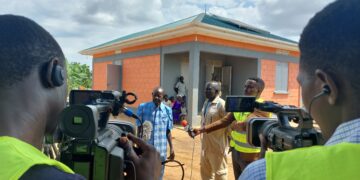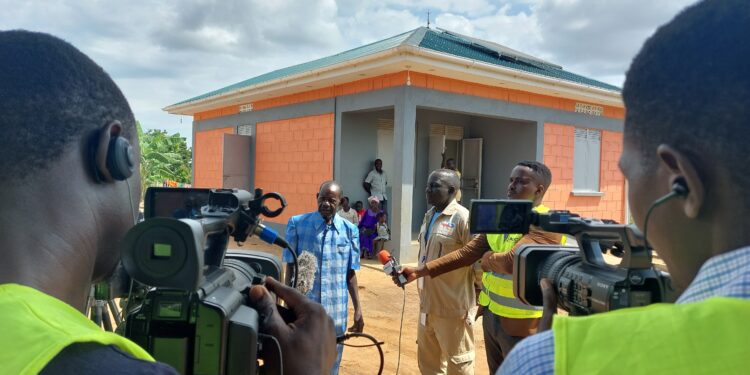Uganda National Oil Company Limited (UNOC) has written to Human Rights Watch (HRW) explaining its participation in the East African Crude Oil Pipeline (EACOP) project and the upstream oilfield development projects in Uganda as well as observations on the land acquisition process for the projects.
This is in response to a lopsided report by HRW alleging that UNOC’s projects infringe on project-affected persons’ human rights.
UNOC holds a 15% participating interest in the Tilenga and Kingfisher oilfield development projects, as a non-operator in the joint ventures.
Similarly, UNOC also holds a 15% shareholding in EACOP Limited, the company that was created to construct and operate the East African Crude Oil Pipeline that runs from Kabaale, Hoima District in Uganda to the Indian Ocean port of Tanga in the United Republic of Tanzania.
The other shareholders are TotalEnergies (62%), Tanzania Petroleum Development Corporation (15%) and CNOOC (8%).
According to Proscovia Nabbanja, UNOC Chief Executive Officer, EACOP Limited is developing the project on behalf of the shareholders and has an established governance structure that includes the Board of Directors and Management.
The Petroleum Authority of Uganda (PAU) is the regulator for both the upstream and midstream (pipelines) segments of the sector in Uganda.
As a JV partner in the upstream projects and shareholder in the EACOP project, UNOC is working closely with the Operators of the upstream projects (TotalEnergies and CNOOC) and EACOP Limited in the processes of acquiring the land required for the projects in Uganda.
In a June 27 letter addressed to Richard Pearshouse, Director of Environment and Human Rights at HRW, Nabbanja said they have made research into livelihoods affected by the EACOP pipeline and Tilenga oil fields.
“It is with this background that UNOC holds the view that the land acquisition process carried out by the upstream Operators and EACOP Limited is in conformity with the national laws, and the International Finance Corporation (IFC) Performance Standards,” wrote Nabbanja.
“Contrary to the information stated in your letter, the total number of Project Affected Persons (PAPs) for the EACOP project is 13,161, of which 3,648 are in Uganda. Out of the 3,648 PAPs in Uganda, 204 are physically displaced by the project and are required to be relocated. You may find other useful facts on the EACOP project land acquisition from the project website (https://eacop.com/land-acquisition/).”

She requested details of the evidence referenced as noncompliance to the Uganda legal and regulatory framework as well as the IFC Performance Standards (“Equator Principles”) with respect to the process of land acquisition for the projects.
“We also request that HRW elaborates and confirms that the 75 people interviewed by Human Rights Watch during the research fall under the classification of Project Affected Persons as per the Law and the IFC Performance Standards. This will enable UNOC to follow up with the upstream Joint Venture Partners as well as the shareholders of EACOP Limited and respond to you appropriately,” she noted.
She added: “We, therefore, recommend that Human Rights Watch should create an opportunity to engage with EACOP Limited and the upstream Operators on the issues you have raised in order to facilitate the research to be grounded on accurate project information.”
RESPONSES TO THE ISSUES RAISED BY THE HUMAN RIGHTS WATCH
- Does UNOC have a human rights policy or a human rights due diligence policy?
As a company that is wholly owned by the Government of Uganda, UNOC adheres to the Constitution of the Republic of Uganda and the relevant laws. Chapter 4 of the Constitution provides for the human rights and freedoms of all persons. UNOC has internal policies including our Code of conduct which addresses human rights and are consistent with the applicable Ugandan laws on Human Rights. In addition, we recognize the international Human Rights standards and require our suppliers to adopt similar standards on Human Rights.
Therefore, UNOC is committed to respecting the human rights and dignity of all persons within our areas of operations. Our engagements with the people we deal with including employees, suppliers, contractors and communities include conducting Human Rights awareness and we encourage all stakeholders to report any incidences pertaining to Human Rights abuse in our projects.
- Does UNOC have a grievance redress mechanism? If so, is this mechanism applicable to this project? Has UNOC received any complaints via this mechanism? If so, how have these complaints been handled?
UNOC has a grievance management mechanism which is applicable to all its projects. In accordance with the grievance management procedures, for projects where UNOC is a non-operator (i.e. the Tilenga, Kingfisher and EACOP), the grievances are received and forwarded to the company or entity responsible for the daily operational project activities. UNOC follows up with the relevant entities on the grievances up to the closeout.
As a shareholder in EACOP Limited, UNOC takes a keen interest in human rights issues, land acquisition and grievance management and these are part of the topical issues for the EACOP board on which UNOC has representation. The EACOP Project has put in place a Community Grievance Mechanism in Uganda since 2018 that is publicized. EACOP Limited regularly provide awareness of the grievance mechanism to ensure that aggrieved parties are aware of their right and the avenues for redress. The grievance mechanism enables the filing, investigation, and resolution of community grievances. The grievance mechanism is aligned with the effectiveness criteria for operational-level company non-judicial grievance mechanisms as set out in the United Nations Guiding Principles on Business and Human Rights.
EACOP Limited works closely with district authorities where relevant to investigate and define resolutions for grievances. There are numerous avenues that have been created to facilitate and encourage grievance reporting which include field-based stakeholder engagement and land acquisition teams, a toll-free number, and a dedicated email address. To date, the EACOP project in Uganda has received 871 grievances (211 of the 871 received from women), out of which 790 have been conclusively resolved.
The regulator is also kept updated on the grievances and where required they intervene to ensure appropriate and timely closure of the grievances. The other key institutions in the country mandated to oversee the industry activities such as Parliament, and Uganda Human Rights Commission (UHRC) regularly visit and evaluate the performance of Operators.
- What steps has UNOC taken to ensure that TotalEnergies and its subsidiaries respect the highest environmental and social standards in the implementation of the EACOP project, and the land acquisition process in particular? Has UNOC conducted any monitoring of the land acquisition so far and its impacts on communities?
UNOC has participated in both the Planning and Implementation phases for the Resettlement of PAPs relating to the EACOP and upstream projects.
In the planning phase, the upstream JV partners developed a Land Acquisition and Resettlement Framework (LARF) that complies with the law and the IFC performance standards and is being followed for the acquisition of land required for the projects. The LARF was developed through an extensive consultative process with the relevant project stakeholders and was approved by the Government of Uganda in December 2016. It may be accessed on the regulator’s website. The framework was also adopted for the EACOP project land acquisition needs in Uganda. A similar LARF was developed and approved for the Tanzanian Section of the project activities. As a shareholder, UNOC participated in the review of the Resettlement Action Plans to ensure that it complies with the Ugandan law and the IFC performance standards and the RAP for the EACOP project was approved by the Government of Uganda in April 2021.
In the implementation phase, UNOC participates in stakeholder engagements with Project Affected Persons and different stakeholders. UNOC has also participated in and witnessed the disclosure of entitlements, Financial Literacy Training, Bank accounts opening and compensation agreement signing for projects in Uganda. The process has been transparent, comprehensive, and compliant with the law, IFC standards and approved LARF and applicable internal policies. In addition, EACOP Limited constituted shareholders’ technical committees including Land and Social Advisory Committees drawing membership from all the shareholders. This committee identifies and addresses any gap in the project on a case-by-case basis. The reports of these technical committees are discussed by the Board of EACOP Limited on which UNOC is represented.

The Environmental and Social Impact Assessment (ESIA) for EACOP was conducted and approved by the National Environmental Management Authority (NEMA) and UNOC together with other shareholders of EACOP, ensuring that this is complied with during the project implementation. The Ministry of Energy and Mineral Development (MEMD), and the Petroleum Authority of Uganda ensure that the EACOP and upstream projects comply with the laws and approvals granted by the Government.
- In view of the previous reporting on problems with the land acquisition process for the EACOP pipeline, what steps has UNOC taken to ensure that TotalEnergies and its subsidiaries are paying compensation rates that reflect market rates and are not below, and in some cases substantially below market rates?
As a shareholder in the EACOP, UNOC works closely with TotalEnergies through participation in the key RAP processes to ensure that EACOP Limited follows the legitimate legal processes in Uganda in determining the market rates for paying compensation to the Project Affected Persons.
The Uganda legislation specifies the processes for the valuation of assets to provide fair and adequate compensation for losses resulting from displacement. Assets for compensation are valued on the basis of market price. In addition to the market value of the asset, a PAP is also entitled to a disturbance allowance. In the event that payment of the compensation amount is delayed, a PAP is also given an annual uplift payment for every year of delay.
The Chief Government Valuer (CGV) in the Ministry of Lands, Housing and Urban Development is responsible for the valuation of assets. Valuation may also be done by certified valuers registered under the Uganda Surveyors Registration Board and the CGV approves the valuation assessment report for asset valuation conducted by such valuers. Interest in land and permanent buildings applies to the market rates which are derived from the market survey conducted by the office of the CGV. Compensation for temporary assets like crops and trees applies statutory rates published by the different districts. These legal processes were adopted in the LARF and RAPs for the projects.
In this respect, all valuation assessment reports for the EACOP and upstream projects in Uganda have been approved by the CGV confirming the market value of the properties affected by the projects and that PAPs receive compensation at full replacement value. The RAPs were approved by the relevant authorities before their implementation. In undertaking the land acquisition for the projects, the eligible physically displaced PAPs were offered the option of in-kind replacement or monetary compensation. The details of the compensation calculations are transparent and can be accessed on the EACOP website.
UNOC is not aware of the problem of inadequate compensation you indicated in your question above. We will be pleased to receive from you complaints from PAPs that have been offered or paid compensation amounts that are lower than the market rates established in accordance with the processes elaborated above.
- Beyond the limited measures outlined in the RAP, what steps does UNOC plan to take to ensure TotalEnergies and its subsidiaries are restoring or enhancing livelihood from pre-disturbance levels, including but not limited to livestock, food and, training on new techniques and assistance with school fees?
The prevailing livelihood restoration package for the PAPs was determined during the RAP studies based on wide consultation with various stakeholders including the project-affected persons. The package was subsequently approved by the relevant authorities and as such we deem it adequate. However, if there are any emerging issues in respect of the livelihood restoration programs then UNOC uses the applicable project structures (i.e. Board meetings for EACOP and the Operating Committees for upstream projects) to have the concerns considered.
- What steps, if any, has UNOC taken to ensure TotalEnergies and its subsidiaries make sure affected people are able to understand and freely consent to compensation agreements? Have affected persons received legal and/or other forms prior to signing compensation agreements?
UNOC participates in and witnesses the process of signing compensation agreements. Before signing the compensation agreement, EACOP provides statutory disclosure where PAPs were given a period of 3 months to study and understand their entitlements and to enable them to make necessary consultations. Where a household is affected by the project, both spouses are engaged in the process.
During the entitlement briefings and compensation, the compensation agreements are interpreted by the field teams in the languages that the PAPs understand. The translators ensure that the PAPs understand their entitlement. PAPs that agree with the contents of the documents sign their compensation agreements in the presence of the sub-county and village leaders including the chairpersons of Local Council 1 (LC1) for the areas, spouse, their chosen witness, the translator, and a lawyer. The agreement is also signed by the LC1 chairperson, representatives from EACOP, and the Ministry of Energy and Mineral Development. Thus, the PAPs sign the agreements in full knowledge of the amount they will receive.
Third-party legal advice is made available to PAPs by a joint venture between a legal firm and a land valuation firm that provides legal counsel and answers any questions that PAPs might have about their entitlements and legal rights. PAPs who are not ready to sign the compensation agreements are given 14 days for reflection, and consultation with third parties and they are informed of their rights to seek legal advice.
Additionally, the compensation agreement contains:
- A certificate of attesting witness that confirms the document was read and explained to the PAP in a language understood by them. The attesting witness must be an advocate.
- A certificate of translation and verification of signature which confirms that the document has been read over in a language the PAPs understand and all that the terms and conditions of the compensation agreement were explained to the illiterate PAPs. A witness and a translator sign the document.
EACOP Limited has been communicating verbally and in writing to the PAPs including through the EACOP Community Newsletter that they should feel free to speak up and report if something doesn’t seem right and that they should make sure that they do not feel coerced into signing compensation agreements. The Newsletters are also translated into local languages. EACOP has also encouraged the attendance of civil society representatives and NGOs during the compensation activities.











